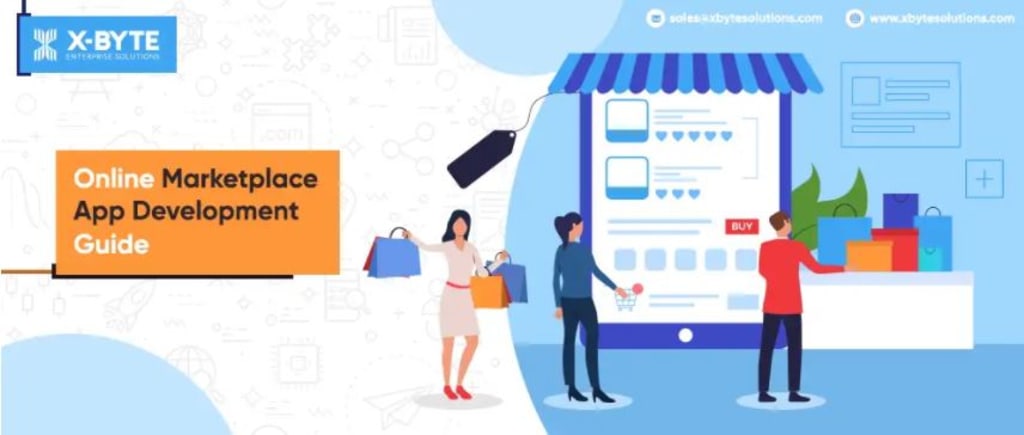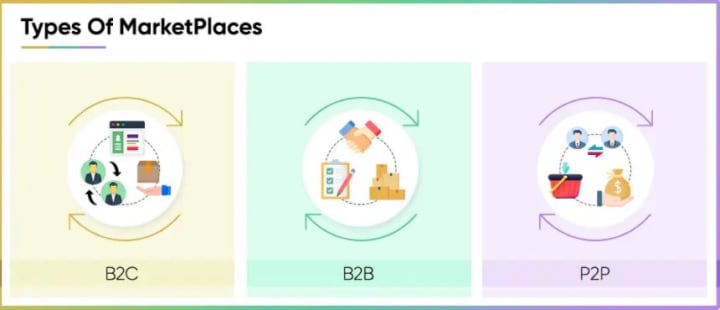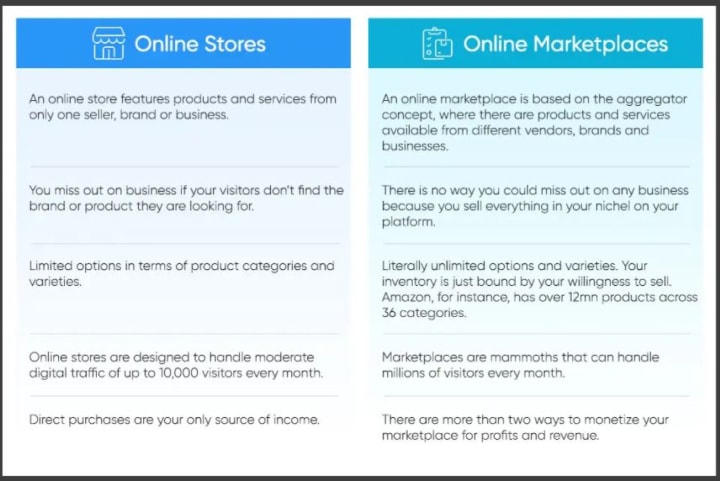Online Marketplace App Development Guide Before You Startup
Mobile App Development Company in USA

Marketplaces are no longer synonymous with the crowded avenues on weekend mornings. People don’t flock to a commonplace anymore. Nor do they wait in line to purchase their preferred products and services on deals. With online marketplace app development everyday is either a sale or a festive occasion with people buying things they needed, didn’t need, felt impulsive to buy and more.
From hand picking farm-fresh vegetables and groceries to manually trying out apparel and clothing accessories, we have come to getting them delivered at doorsteps and trying them on virtually through AR and VR technologies. Online marketplaces are the current rage and their prominence has increased further after the onset of the global pandemic.
While every other industry either shut down or struggled to cope up with its operations and crumbling economic conditions, the only industry that not just survived but soared during the pandemic was eCommerce and its allied segments like marketplaces, on-demand business services and more.
People preferred to stay away from any and all forms of human contact and decided to shop online. Even the boomer generation that was staunchly against online shopping and other forms of non-conventional mediums got a taste of marketplaces and their convenience. This pushed several businesses out there to bring in digital transformation into their operations and prefer marketplace app development to attract new customers from beyond their geographical locations.
So, if you’re someone who is eyeing marketplace mobile app development for your venture, this exclusive guide is just for you. We break down all essential details you need to know about marketplace development including what it is, its advantages, setting up an online marketplace and more.
Let’s get started.
What Is A Marketplace?
Visualize a commercial complex in your neighborhood that has multiple shops across diverse genres, products and services. When you visit these complexes, you are free to go to any shop and purchase your preferred products. The same applies to malls and shopping avenues as well.
Now, imagine the same mall on the internet. What you will see is a marketplace - an online platform that offers products, brands and services for you to choose from. There are shops from different vendors and brands and you have amazing options to choose from.
Furthermore, these brands are also competing with their deals and discounts to get you to purchase from their shops. This is exactly what a marketplace is all about.
To access these marketplaces, you either use a website or an app. The latter is gaining more popularity these days.
Key Statistics
Before we further understand marketplace development, let’s look at some key statistics to get to know the market conditions better.
- eCommerce sales topped over $4tn in the year 2020.
- Amazon’s profits grew by around 80% in the same time.
- Over 3.4bn people across the world purchase products and services from the eCommerce sector.
- eBay has over 1bn active listings on its platform.
- On an average day, over 2 billion transactions happen on eBay.
Types Of Marketplaces

Before you venture into marketplace development, you should understand that there are different types of marketplaces. From the outlook, they all look the same but when you dig deeper, you realize the subtle differences they showcase. Let’s look at what the types of marketplaces are.
B2C
B2C stands for Business To Clients and these are marketplaces setup by marketplayers to cater to the needs of consumers. For instance, consider Amazon, Walmart, TaskRabbit (service) and more. Marketplace development strategies for the B2C domain are unique.
B2B
Abbreviated as Business To Businesses, these cater to other businesses. These could be wholesale units that supply to local vendors, who ultimately sell to consumers. They could also be industrial units that distribute products and goods to multiple vendors across the globe. B2B marketplace development requires a niche approach and a different type of marketing and targeting technique. Alibaba B2B is the best example for this sector.
P2P
Peer To Peer is the full form of P2P and the aim of this marketplace is to connect sellers with buyers. While it does sound similar to B2C, the major difference here is that sellers and buyers are both individuals.
For instance, if an individual from Colorado decides to sell their Lego collection, an interested buyer would contact them through the P2P platform from California and place an order. Packaging, shipping and fulfillment are all done by individuals in this segment. eBay is the most ideal example of P2P marketplaces.
Why Can’t I Open An Online Store Instead Of Getting Into Marketplace App Development?
While online stores and marketplaces are both concepts of the eCommerce spectrum, one has a significant edge over the other. At this point, pay attention to the term ‘edge’ here because both are unique, beneficial and super-convenient at the same time.
However, online marketplaces have an edge over their online store counterparts that will prove to be profitable for those who prefer online marketplace app development.
To help you get a clear idea of what this edge is about, here’s a quick tabular comparison.

Your Guide To Marketplace App Development
Marketplace app development isn’t simple. Right from ideation and designing an effective platform to ensuring orders are fulfilled on time, all modules, processes and systems should fall in place and work in tandem with each other. For those of you who are just starting out, these quick tips on marketplace app development and marketplace website development will help you get an idea of the complete picture.
Decide On Your Market Segment
One of the first steps in marketplace development is to decide on your market segment. Like we saw, there are three types of marketplaces - B2B, B2C and P2P. Based on your domain expertise, interests, experiences and team available, you should decide the segment you are about to venture into.
This will help you decide the type of website or app you will eventually build, the networking you should do, the associated marketing and promotional strategies, business models and more.
The Core Features
Regardless of whether you prioritize marketplace mobile app development or a website, there are some core features that you need to incorporate into your marketplace platform.
- Your platform should have three essential panels - admin, customer and seller.
- Admin panel is the backbone of your platform’s operations and is the bridge between buyers and sellers. Admins manage website operations, add/remove sellers and buyers, maintain products and inventory, optimize supply chain and do more.
- A Customer panel is the client-facing module that allows people to create accounts, shop for their products and services, checkout seamlessly, compare prices, get personalized recommendations and more.
- The seller panel, on the other hand, has all the details about individual sellers, their products and inventory, bank and transaction details, product catalogs, product images, fulfillment methods and more.
- Besides these panels, your marketplace development checklist should include tech concepts like artificial intelligence and machine learning for personalization, recommendation engines, analytics and more.
- Voice search is increasingly becoming inevitable and people today are buying products through their virtual assistants and devices. So, optimize your platform for voice search and dictation.
- Have in-app messaging systems to let buyers interact directly with buyers and get their questions answered.
The UI And UX
Marketplaces are convenient platforms by default. However, not all platforms manage to deliver convenience to their customers. One of the major aspects they fumble is on developing a good UI for their visitors. A lot of businesses have an amazing line up of products, deals and discounts, fulfilment strategies and more but end up making no sales because of their faulty UI and UX.
To avoid such instances, keep your website as minimal and smooth as possible. Don’t clutter and overwhelm your visitors with information. One of the first things you should let them do is search for their preferred products and services.
Most visitors are on your platform for a specific reason and your platform should let them accomplish their task first. Upselling and product recommendations should only follow and not be number-one priorities.
So, develop an appropriate prototype and wireframe that lets your visitors navigate freely and shop like they would on a physical complex. Develop an MVP if you have to and test it out. Validate results and keep optimizing your online marketplace development plan for visitor retention and satisfaction.
Selecting The Ideal Business Model
Like we mentioned, there are more than two ways to monetize your marketplace. Let’s explore what they are.
Commissions Model
This is the most popular marketplace business model, where platform owners take a cut as commission for every product or service sold on their portal.
Premium Listings
If you’ve used a marketplace, you would know that search results are mixed bags of products from multiple brands. To help businesses get traction, you could introduce a premium listings option, where brands can pay to stay on top of search results. So, when visitors look at search results, they would automatically click on the first search result and shop from the brand.
Sponsored Promotions
Besides just listing brands and businesses, you could also offer real estate on your portal to interested brands. You could let them run a full-fledged advertisement such as a banner ad, a video or something more interactive on your platform for a cost.
Brand Collaborations
This is an interesting way to generate more revenue for your marketplace. You could network and collaborate with local brands and businesses to have them as partners or exclusive vendors of their products. So, when visitors are looking for their products online, they would find it only on your marketplace. Such collaborations offer benefits for both the parties involved.
The Development Team
Marketplace app development is more complex than your mobile app development process. There are more modules to implement and more features to incorporate. Besides, your marketplace should be built to be stable at all times and manage heavy traffic during sale days as well. That’s why you should assemble the dream team for your marketplace development.
The right team will know the tech stack to implement, the programming language to use and the right databases to deploy.
Wrapping Up
So, this is the extensive guide on marketplace development. We believe you now have a better idea of what the entire concept is all about. If you’re at the verge of starting your own marketplace, we recommend you reach out to us.
We are pioneers in marketplace app development and we will deliver the most impeccable and innovative solution your idea and ambition deserve. We have the best minds working in our development teams.
Read Full Blog Here : Online Market Place App Development






Comments
There are no comments for this story
Be the first to respond and start the conversation.